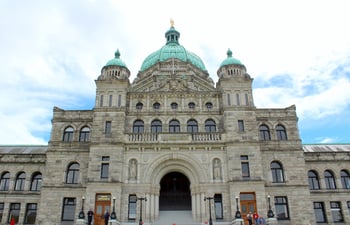 So far, 2018 is turning out to be an important year for poverty reduction in BC. Currently, 557,000 people are living below the poverty line in Canada’s most western province – the second highest provincial poverty rate in the country. Against this sobering backdrop, the BC government has just completed a broad range of consultations with a variety of citizens, including people with lived experience. In June 2018, the government will release a “What We Heard” report summarizing feedback from the consultations, with plans to introduce poverty reduction legislation this fall. The intended result is the development and implementation of a poverty reduction strategy.
So far, 2018 is turning out to be an important year for poverty reduction in BC. Currently, 557,000 people are living below the poverty line in Canada’s most western province – the second highest provincial poverty rate in the country. Against this sobering backdrop, the BC government has just completed a broad range of consultations with a variety of citizens, including people with lived experience. In June 2018, the government will release a “What We Heard” report summarizing feedback from the consultations, with plans to introduce poverty reduction legislation this fall. The intended result is the development and implementation of a poverty reduction strategy.
As the BC government acknowledges, there are many signs that life is becoming increasingly unaffordable for British Columbians. High housing and food prices, low rental vacancy rates, a dramatic increase in the need for child care, and the increasing gap between wages and the cost of living have all contributed to an increased depth of poverty in the province over the last decade.
Recognizing the urgency of the issue, the BC government has already begun to take several steps to address poverty in advance of releasing its full strategy. Below are some of the highlights of recent poverty reduction initiatives.
Income, Employment and Education
With working adults comprising nearly 40% of those living in poverty in BC, the government has announced a series of minimum wage increases. Minimum wage, which currently sits at $11.35 an hour, will increase to $12.65 an hour on June 1, 2018, $13.85 an hour on June 1, 2019, $14.60 an hour on June 1, 2020, and $15.20 an hour on June 1, 2021.
Effective October 1, 2017, income assistance and disability rates increased by $100 per month, bringing monthly rates to $710 for an individual receiving income assistance and $1,133 for an individual re bring to support those most in need. New earnings exemption increases of $200 per month were also introduced, meaning an unattached person receiving income assistance can now earn $400 per month, while an individual receiving disability assistance can now earn $1000 per month. Starting January, 2018, those in receipt of disability assistance receive an additional $52 per month for a new transportation supplement, which can be used for an annual bus pass or other transportation needs. While generally, it is recognized that these measures are still insufficient to meet the needs of our most vulnerable citizens, they can be considered a step in the right direction.
The Single Parent Employment Initiative provides single parents on income assistance or disability assistance with up to 12 months of funded training or paid work experience. This includes full costs of child care and transportation during training and for up to 12 months after they enter the workforce.
Importantly, tuition for Adult Basic Education has been eliminated once again, and former youth in care between the ages of 19 and 26 are eligible to have tuition waived for BC public post-secondary institutions.
Health and Dental
The government has enhanced the Dental Supplement for eligible individuals under the age of 19 by raising the 2-year basic dental limit from $1400 to $2000. Children enrolled in the Healthy Kids Program now have access to Hearing Instrument Supplements and the Alternative Hearing Assistance Supplement. Underage recipients of income, and disability assistance, including Schedule C benefits and School Start Up, are now eligible for General and Health supplements, and underage recipients of hardship assistance have access to the same supplements as dependent children on hardship assistance.
Beginning January 1, 2019, Fair Pharmacare Plan deductibles will be eliminated for those earning between $15,000 and $30,000, and reduced for those with a net household income under $45,000. For households with an annual net income up to $120,000, Medical Services Plan (MSP) premiums have been reduced by 50%, and families with an annual net income of $26,000 (up from $24,000) pay no premiums.
Child Care
As of April 1, 2018, parents with children in licensed child care facilities registered with the program will be eligible for the following fee reductions:
- $350/month/space for group infant/toddler care
- $200/month/space for family infant/toddler care
- $100/month/space for group care for children aged 3-5 years
- $60/month/space for family care for children aged 3-5 years
The government also announced that, starting in September 2018, a new Affordable Child Care Benefit will replace the current Child Care Subsidy Program. The new benefit will result in significant cost reductions for families with pre-tax incomes under $45,000, with a sliding scale of benefits for households earning up to $111,000. The benefit will be available in 2018-19 for those using licensed infant and toddler care, and then in 2019-20 for those using care for 3-5 year olds. This will be a huge step in the right direction.
Housing
BC’s comprehensive housing plan, announced in the 2018 budget, will result in investments of more than $1.6 billion over three years to build and maintain affordable rental housing, help finance student housing, increase rental assistance for low-income seniors and working families, and provide supportive housing for at-risk British Columbians.
So far, the new approach has led to a feeling of hope that at long last change is on the horizon. The newly formed Advisory Committee on Poverty Reduction includes representatives from across the province as well as key stakeholders like the BC Poverty Reduction Coalition, which has long been calling for a strong, comprehensive poverty reduction strategy with legislated targets and timelines. This new atmosphere of engagement and open conversation is a breath of fresh air. The key will be for the province to support an inter-ministerial approach that is human rights-based, including the rights of Indigenous Peoples. Stay tuned!
Written by: Jill Zacharias, City of Revelstoke; with Adam Vasey, Tamarack Institute





